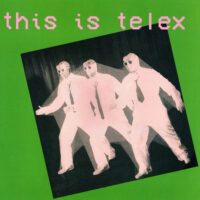
I’m not in the habit of reviewing greatest-hits and best-of releases for this blog, but sometimes the curation is so strong and the discography of the artist diffuse enough in quality that it makes sense to do so. Such is the case with This Is Telex, a 14-song overview of the influential Brussels trio Telex.
Belgium’s answer to Yellow Magic Orchestra and Yello, Telex consisted of of Marc Moulin, Dan Lacksman, and Michel Moers. Before he formed Telex, Moulin was a prog-jazz genius in the group Placebo, whom crate-diggers/hip-hop producers worship with a reverence usually reserved for the likes of Melvin Bliss and Incredible Bongo Band. Few musicians from Moulin’s realm made the transition to synthwave-pop/cult status, which in itself is innately fascinating. (Rainbow keyboardist Tony Carey comes to mind, but even that’s a stretch; Kraftwerk obviously were influential on synthwave, but were never of it.)
Telex come across as arch keyboard/drum-machine virtuosos slumming it in the nascent synth-pop scene (they even entered that bastion of fromage overload, the Eurovision contest) and then realized that, “Hey, we’re enjoying this more than we thought and the hipsters are slurping it up.” It seems like this comp should’ve come out 10-12 years ago, the better to capitalize on the renewed interest in minimal/synthwave, but better late than never—Mute probably had to cut through thickets of record-company red tape to seal the deal.
This Is Telex begins grandly with a a radical reinvention of Sonny Bono’s ubiquitous 1967 hit “The Beat Goes On,” turning the groovy pop nugget into a chunky, bleepy slab of electro-funk, its rhythm uncannily foreshadowing Soul II Soul’s 1989 hit, “Back To Life.” (This album’s the only place you can find “The Beat Goes On/Off.”) The interpretation establishes Telex as masters of transformative covers. Another excellent example of this is “Dance To The Music,” in which the trio transform Sly &The Family Stone’s 1968 hit into silver-lamé’d robo-disco with diseased talkbox vocals. Telex excised the soul and funk from the original, but their makeover is still a riot that’ll have crowds laughing as much as they’re dancing. They’ve reproduced the absurdist, poker-faced effect that Flying Lizards had with “Money” and Devo had with “Satisfaction.”
More alchemy occurs on “La Bamba,” as Telex convert this traditional Mexican folk song into laggard trip-hop—no easy feat. On “The Number One Song In Heaven,” they bring a dash of poignancy to Sparks’ ebullient, Giorgio Moroder-produced original while slowing the tempo to an elegant shuffle. Speaking of Sparks, this comp features two collabs with the Mael brothers: “Drama Drama” and “ Exercise Is Good For You.” This joint venture—the Maels wrote the lyrics, Moers composed the music—makes sense as both groups revel in camp and humor, flamboyant melodies, and sly dance beats. Trivia: ZZ Top, of all people, used to cover “Exercise” live, often using it to close out their shows. One diversion from Telex’s usual tongue-in-cheekiness is “Dear Prudence” (which is exclusive to this compilation). Telex appear to be playing it straight, exhibiting authentic love for one of the Beatles’ most sublime psychedelic ballads. Their version’s synthetic to the core yet still hits deeply in the heart.
As for Telex’s original tunes, “L’amour Toujours” sounds at once like a parody and a genuine specimen of suave continental disco; Yello pulled the same trick. It exemplifies Telex’s penchant for creating music of artful ambiguity, as does “Eurovision,” a sincere-seeming stab at trying to win the titular songwriting contest in 1980. The result is more like a saccharine homage to Kraftwerk’s “Neon Lights,” though, and it nearly came in last place—which was the group’s goal. The wonky electro-funk of “Radio-Radio” slaps hard, proving itself to be a Belgian counterpart to Zapp’s “More Bounce To The Ounce.” Telex’s best-known song is “Moskow Diskow” from 1979’s Looking For Saint Tropez. An influence on techno, it zips through the club like a speedier “Trans-Europe Express,” replete with a synth mimicking a train whistle and percussion emulating said vehicle’s rhythmic chug. No wonder Detroit techno great Carl Craig jumped at the chance to remix it on the 1998 remix album of Telex cuts, I Don’t Like Music.
A cursory listen to Telex may lead some to regard them as a quasi-novelty band, but the impact that their deceptively advanced and detailed music had on electronic music from the ’80s onward is no joke. -Buckley Mayfield
Located in Seattle’s Fremont neighborhood, Jive Time is always looking to buy your unwanted records (provided they are in good condition) or offer credit for trade. We also buy record collections.


